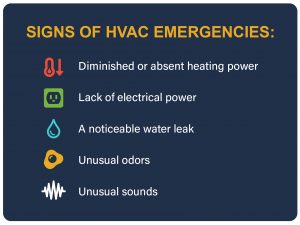Some heating and cooling issues might be able to wait a few days before being inspected. Other HVAC problems require immediate attention. What constitutes an HVAC emergency? When should you contact a local HVAC contractor?
How to Identify an HVAC Emergency
 Pressing HVAC troubles can not only be a nuisance, but they can present serious problems to your commercial and residential properties. Luckily an HVAC maintenance pro can help diagnose and remedy the problems. Not sure if you should call in the professionals? Our HVAC contractors share some signs of HVAC emergencies and when to take action.
Pressing HVAC troubles can not only be a nuisance, but they can present serious problems to your commercial and residential properties. Luckily an HVAC maintenance pro can help diagnose and remedy the problems. Not sure if you should call in the professionals? Our HVAC contractors share some signs of HVAC emergencies and when to take action.
Assess the Situation:
HVAC emergencies can present in the following ways:
- Diminished or absent heating power
- Lack of electrical power to your heater or other appliances
- A noticeable water leak
- Unusual odors, like rotten eggs or burning smells
- Unusual sounds coming from furnace or air vents
The first step if any of the above problems present themselves is to stop the damage from getting worse. Shutting down the power and turning off the heater or water main can allow you time to assess the situation.
Call an HVAC contractor if the problem you are experiencing in your residential or commercial property:
- Continues after shutting off power, water, or heat
- Presents any immediate danger (such as smoke or sparks)
- Affects your ability to go about your daily personal or professional activities
5 Common HVAC System Emergencies
1. Clogged Condensate Line
A majority of HVAC service calls are about air conditioning leaks. The most common cause of leaks is due to a clogged condensate line. The condensate line collects excess moisture and moves it outside to prevent damage to your HVAC system. This line can become clogged with dirt, algae, and rust. When this occurs water can’t evacuate the system properly, leading to leaks. While the leaks generally start off small, they can cause serious water damage if not taken care of early on.
To ensure your condensate line is functioning at its most efficient, it’s important to schedule routine maintenance before any major leaks occur.
2. Frozen Outdoor Unit in the Winter
It’s common to have trace amounts of frost on your outdoor unit during the colder, winter months. If your unit is covered in ice for an extended period of time, it can cause long-lasting damage.
When there is ice build-up, either internally or externally, this can be indicative of a poorly functioning defrost cycle on your machine. There are several causes for this, like a bad fan motor or low refrigerant charge. If you notice an iced-over unit it’s best to call your local HVAC contractor.
3. Frozen Coils in the Summer
Frozen coils during the summer occur when the refrigerant temperature is below freezing. This results in the surrounding air to condense and freeze. There are several factors that cause the refrigerant temperature to become so low including:
- Running the A/C when it’s below 60 degrees outside
- Running the A/C too low
To avoid an unexpected HVAC emergency, your residential HVAC installers recommend that homeowners set their A/C at or above 70 degrees. If the issues above aren’t the cause of your frozen A/C unit, then other common factors, like blocked airflow or refrigerant leaks.
4. Blown Fuses and Tripped Breakers
An overworked blower in your HVAC system can cause blown fuses and tripped circuit breakers. If the airflow is blocked due to a dirty air filter this can put stress on your blower. This blockage can cause your blower to overuse energy, which results in tripped breakers.
Schedule an appointment with your HVAC installer to perform a routine air filter checkup. They might recommend replacing the air filter before resetting the circuit breaker.
5. Malfunctioning Furnace
Furnace problems can be the result of a variety of factors. A malfunctioning thermostat, controller issues, cracked heat exchangers, and dirty filters can all cause your furnace to function poorly.
If you notice a scraping sound, or other atypical noises emanating from your furnace, the ball bearings or belts might be failing. A yellow flickering pilot-light could indicate excess carbon monoxide. If you are experiencing any furnace-related issues, we recommend scheduling an appointment with a technician as soon as possible.
To prevent minor problems from turning into major emergencies, have your furnace regularly serviced by an HVAC professional. Scheduling preventive maintenance keeps your furnace running in tip-top shape, saving on costly repairs down the line.
Commercial and Residential Emergency HVAC Repair in Portland and Beaverton
If you think you are experiencing an HVAC emergency, call one of our trusted HVAC professionals. We offer 24-hour emergency service and repair for your urgent situations.
Looking to schedule routine maintenance to keep your system running smoothly? Stop by one of our two locations in Portland or Beaverton to meet with one of our HVAC contractors.